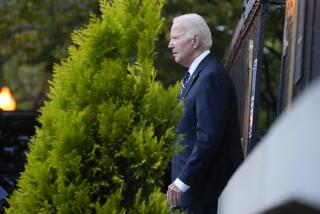U.N. Officials Call Interview Process a Bust
- Share via
BAGHDAD — When the first Iraqi scientist agreed to sit for a private interview with weapons inspectors without any official “minder” present, U.N. officials hoped that it was the beginning of an end to the dispute over interviews that had called into question Iraq’s willingness to cooperate with the United Nations.
But now, nearly two weeks later, U.N. officials are becoming increasingly frustrated that Iraq is paying only lip service to the demand for private interviews. In fact, they say, they have not had one successful interview with any of the scientists that they had asked to speak to about Iraq’s alleged biological and chemical weapons programs.
“There were roughly 30 attempts made to interview Iraqis in private, and three such interviews took place,” Hiro Ueki, spokesman for the inspection teams in Baghdad, said Tuesday.
Each of those three individuals had been suggested by the Iraqis, he said. On the other hand, none of the scientists that the U.N. Monitoring, Verification and Inspection Commission, or UNMOVIC, has proposed for questioning have agreed to private interviews. Instead, most insisted on making a tape recording of the interview or on having a relative or friend present.
“We hope that Iraqi interviewees will eventually accept being interviewed in private under UNMOVIC’s terms,” Ueki said.
Three biological and chemical scientists turned up voluntarily for interviews Feb. 7-8, just when chief U.N. weapons inspector Hans Blix and International Atomic Energy Agency chief Mohamed ElBaradei were flying into the country. At the time, Iraqi officials were under intense pressure to show more cooperation with the United Nations or risk the start of a U.S.-led attack to change the Iraqi government and forcibly disarm the country of any banned weapons found.
Responding to the pressure, during early February, Iraq in quick succession offered up the first inspectors for private interviews, agreed to U-2 spy plane flights (the second of which reportedly took place Tuesday), passed a long-sought presidential decree banning weapons of mass destruction and made other promises to be more cooperative in producing lists of potential witnesses and procuring documents to show how it had disposed of past weapons.
The steps led to a fairly mild report by Blix and ElBaradei last week at the Security Council, bolstering countries, such as France and Germany, that have argued that Iraq should be given more time to let inspections work and setting back U.S. efforts to build a consensus for military intervention.
Privately, weapons inspectors say Iraq may have become overconfident that it is off the hook. One official said: “There is a sense that they can get away with anything. Only if the pressure is maintained at a high level do the inspections achieve anything.”
Blix has seen private talks with scientists as a crucial tool to uncover leads to any secret biological and chemical weapons activities, if they exist.
U.N. Security Council Resolution 1441 -- the measure that authorized the return of inspectors to Iraq in November after a four-year absence -- required Iraq to allow private interviews with its scientists and technicians, even outside the country if necessary.
In contrast to UNMOVIC, charged with ridding Iraq of chemical and biological weapons and of long- and medium-range missiles, the IAEA has had more success in interviewing nuclear scientists. That is in part because the IAEA believes that nuclear weapons are by their nature harder to hide than chemical and biological weapons and because there are a variety of technological tools that can be used to verify that the country has dismantled its nuclear program.
Therefore, the IAEA has not been as insistent on private, candid interviews and has accepted the use of tape recorders by the scientists it has interviewed.
Saad Ahmad Mahmoud, deputy director of Al Rashid State Co., was one of the individuals who did agree to a private interview with the IAEA team about his company’s missile manufacturing.
Speaking during a news conference Tuesday organized by the country’s Information Ministry to highlight Iraqi cooperation with inspectors, Mahmoud said there was “no pestering, no pressure” during his three-hour private interview by five people from the IAEA, including an Arabic-speaking scientist who acted as interpreter. Nevertheless, Mahmoud said he considered the private interview needless.
“They have come about as a result of a political decision by the United States,” he complained, adding that everything he told the inspectors during the private session had already been covered with them in open meetings.
More to Read
Sign up for Essential California
The most important California stories and recommendations in your inbox every morning.
You may occasionally receive promotional content from the Los Angeles Times.










